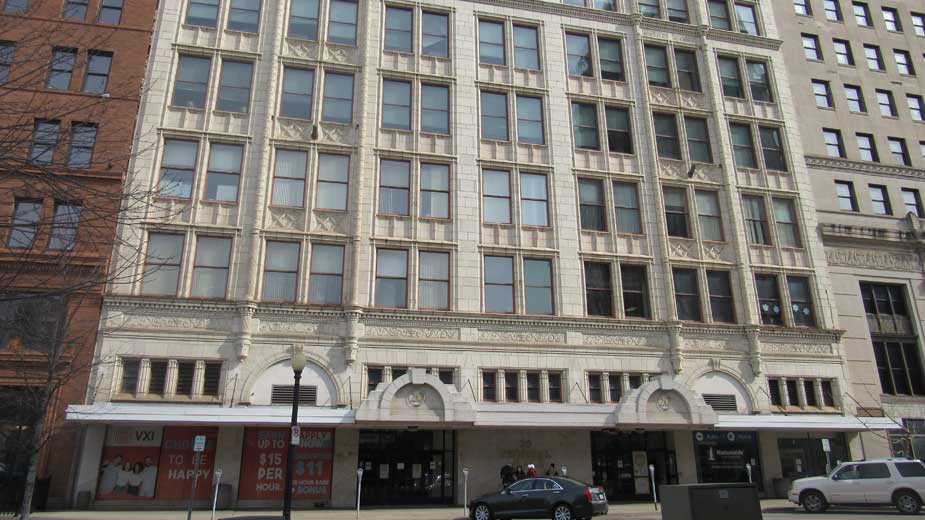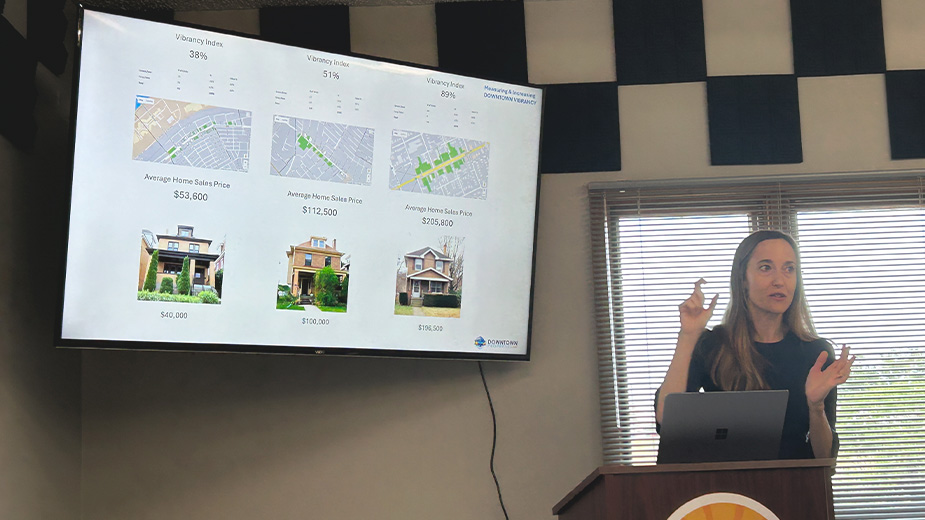Council Committee Debates 20 Federal Project, Tenant Evictions
YOUNGSTOWN, Ohio – Members of City Council’s community planning and economic development committee left their meeting Tuesday with little insight regarding the city’s approach in notifying tenants of 20 Federal Place they would need to leave the building in the next couple months.
Discussion of the 96-year-old building, which the city is working to redevelop and sell, took up about two-thirds of the 90-minute meeting late Tuesday, which at times became contentious.
Among the points of contention are a proposed lease agreement for the city-owned building that came under fire by city administration officials last week, and this week’s disclosure that the city had sent notices informing building tenants that their leases had been terminated and they needed to be out in 60 days.
The building needs to be vacant because of the “extensive nature” of remediation work being funded in part by a $6.9 million brownfield grant the city was awarded last month, just one portion of the proposed capital stack.
A project like 20 Federal needs to qualify for multiple public incentives to make it a “market-rate deal,” said Jim Ambrose, director of business development for Desmone, the Pittsburgh architectural firm the city is working with on the project and which helped secure the brownfield grant.
“The projected market rate value after full transformation right now is about $31 million. It’s going to cost $74 million for us to pull this off with a volatile construction market and all the prices that have been rapidly escalating with inflation,” he said.
Other funding sources Desmone is working toward include state and federal historic tax credits and a state transformation mixed-use development tax credit which, if successful, could cover up to 10% of the project’s cost.
He also reported that National Real Estate Development, a Philadelphia based real estate development firm, has expressed interest in providing $26 million toward the project.
City officials balked at a draft master lease Desmone submitted, arguing it didn’t provide the city’s assets with enough protection.
Desmone, as called for under its MOU with the city, created a private special purpose entity, 20 Federal Place LLC, that would serve as a tool to collaborate and apply for public incentives. The special entity would lease the building from the city for $100 per year per year for a term of up to 50 years. The entity and Desmone also would have the ability to terminate the deal early with no liability
“It’s got to be equitable. It’s got to be fair,” Lou D’Apolito, assistant law director, said.
Mayor Jamael Tito Brown emphasized that he was behind the project 100%, but that the city needs to be protected.
“We want to make sure that when we sit down and talk about contracts, that legal contract protects our public assets,” he said. “As mayor, my job is to make sure legally that we have an out clause that works for us, as well as those who may be the lessee.”
“All you have to do in the lease is just say if we don’t close on the funding sources that we’ve identified via these tax credit mechanisms, via all these public incentives that we outlined in the lease” that the property won’t transfer, Ambrose said. “That’s all you have to do.”
The city will continue to work with Desmone to finalize the lease, D’Apolito said,
“We want the project to succeed as well as anyone,” he emphasized. “We just do not want the city to have some type of liability down the road.”
Fifth Ward Councilwoman Lauren McNally pointed out that the intent of the deal is to get the building off the city’s books.
As it is now, the building is a drain on city finances, Finance Director Kyle Miasek said. The building costs roughly $1.1 million to operate but only collects between $700,000 and $800,000 in rent. The gap is growing as tenants downsize in the current environment, and income tax revenue that used to cover the gap is dwindling as well.
“We can’t continue to lose a million dollars a year on this building,” McNally said,. If the city is able to sell the building to the developer next year, the 50-year lease would be a moot point, she argued.
First Ward Councilman Julius Oliver, whose ward includes downtown, said he wanted to see help for the building’s tenants. He and other council members had discussed the city working with consultants including Economic Action Group, as well as the Youngstown/Warren Regional Chamber, to find downtown real estate inventory for building tenants to relocate to stay in business there, and meetings were being planned to discuss the situation in groups.
Letters “absolutely” should not have been sent to tenants, he emphasized.
“They were already in a position of not knowing or a position of uncertainty,” he said. “So I’m hoping that the letter was sent out by accident or mistake or prematurely.”
The letters weren’t sent by accident, Miasek clarified. Part of the issue was the timing of the grant funds and the need to begin work to meet the grant timelines, while various parties contracting COVID-19 prevented meeting internally to discuss how to proceed.
Representatives of Steadfast City Economic & Community Partners, the consulting firm the city has worked with former more than two years on 20 Federal, are expected in town today to begin meeting with tenants. The city also will work with the Regional Chamber.
“We are going to come up with some solutions to work with some of these businesses,” he said. “There are going to be some limitations.”
Seventh Ward Councilwoman Basia Adamczak, chairwoman of the CPED committee, reflected the sentiments of several of her colleagues.
“The concern is that we knew potentially we were going to get to the point that we were going to have funding awarded, so we should have been doing all of this stuff in advance,” she said. “We’re doing it backwards, and frankly, it’s unjust.”
Also during the meeting, council members were filled in on a proposed incentive deal for Steelite International, which announced plans last month to move its corporate headquarters downtown, and received an update on the YO! small business app and a request to extend the contract with the app’s developer for another year.
Miasek emphasized the need for the city to develop a “catalog of tax incentive programs” as he outlined the proposed agreement with Steelite. The Ohio General Assembly, he pointed out, added a provision to the state budget so that people working from home will pay taxes based on their home office location and not the address of their employers’ operations.
“That shifting municipal income tax landscape will impact Youngstown, “he warned.
The Steelite agreement Miasek outlined calls for the city to provide a job creation tax credit providing annual payments over a five-year period based on the payroll taxes withheld by the city, ranging from 100% the first year to 25% the final year, with the grant paid after taxes are collected. The agreement is based on Steelite relocating at least 60 full-time employees to Youngstown with an estimated payroll of no less than $5 million.
At a news conference last month, Steelite CEO John Miles announced plans to move the company’s headquarters into the Taft Technology Center downtown. The intent is to have legislation requesting the agreement before City Council when it meets July 27.
“The hope is that we are going to work with other businesses and develop similar grants, catering to the size and to the scope of employees and payroll with-holdings, he said, The city has an upcoming meeting with a business that is discussing a “sizable expansion,” he reported.
The agreement also contains a provision to discuss modifying the agreement if payroll falls below 805 of the benchmark, he said
The current contract with New York-based Colu Technologies expires July 31, Nikki Posterli, city director of community planning and economic development, said. The administration also is seeking to increase the contract by $5,000 to $65,000 for the year.
Since the app launched last year, 134 businesses have signed up to participate in the rewards program and 25 have become redeeming businesses, Daniel Bancroft, program manager at Economic Action Group, said. While only $1,000 in “City Bites” have been redeemed by the 1,400 individuals who have signed up for the app, the app has generated $60,000 in economic activity.
“Overall from month to month we’ve seen a 23% increase in economic activity so far this year,” he added. The goal is to grow economic activity to $400,000 next year and users to at least 3,000.
Copyright 2024 The Business Journal, Youngstown, Ohio.



